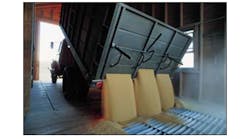OSHA Takes Nebraska Senator to Task for Allegations Concerning Oversight of Small Farms
A senator’s claim that OSHA has been illegally regulating small farms is hogwash, according to a high-ranking agency official.
U.S. Sen. Mike Johanns, R-Neb., recently fired off a letter to Labor Secretary Thomas Perez directing OSHA to stop the agency’s “unlawful regulation of family farms” that use grain bins for storage. Johanns believes that the agency is circumventing a congressional appropriations provision that prohibits OSHA from inspecting small farms.
In an email to EHS Today, however, OSHA Deputy Administrator Jordan Barab asserted that the agency “has clearly not violated the terms of the congressional rider prohibiting the agency from inspecting small farming operations.”
“In fact, due to the rider’s provisions, the vast majority of all reported grain entrapments are not investigated by OSHA,” Barab added.
For years, congressional appropriation bills have included language forbidding OSHA from regulating farming operations with 10 or fewer employees. However, the appropriations language “has never covered post-harvest activities like grain processing,” according to Barab.
“OSHA has a longstanding definition of farming operations: any operation involved in the growing or harvesting of crops, the raising of livestock or poultry, or related activities conducted by a farmer on sites such as farms, ranches, orchards, dairy farms or similar farming operations,” Barab said.
Johanns points to a June 2011 OSHA memo in which Thomas Galassi, head of the agency’s Directorate of Enforcement Programs, asserts that many “small-farm employers mistakenly assume that the appropriations rider precludes OSHA from conducting enforcement activities regardless of the type of operations performed on the farm.”
The memo states that OSHA has jurisdiction over small farms that perform post-harvest crop activities “such as crop cleaning, sun drying, shelling, fumigating, curing, sorting, grading, packing and cooling.”
Johanns argues that OSHA’s interpretation of the appropriations language is so narrow “that virtually every grain farm in the country would be subject to OSHA regulations.”
“In viewing a farm’s ‘grain-bin operation’ as somehow distinct from its farming operation, OSHA is creating an artificial distinction in an apparent effort to circumvent the congressional prohibition on regulating farms,” Johanns contends in his letter to Perez. “The use of grain bins is an integral part of farming operations. Without grain bins, farmers must sell corn and soybeans immediately after harvest, when prices are usually low. Storing grain in bins is thus a fundamental aspect of farming. Any farm that employs 10 or fewer employees and used grain bins only for storage prior to marketing should be exempt, as required by law, from OSHA regulations.”
As a counterpoint, OSHA cites a Purdue University study concluding that 70 percent of all documented grain entrapments have occurred at farms that are exempt from OSHA’s regulations for grain-handling facilities (29 CFR 1910.272).
According to Purdue, which has been tracking agricultural confined-space incidents since 1978, the number of grain entrapments steadily increased from 2002 through 2010. In 2010, some 57 workers were engulfed by grain stored in bins, and 26 of those workers died – marking the highest fatality count on record.
“OSHA responded immediately by developing an initiative that included outreach, compliance assistance, education and ultimately enforcement,” Barab said. “We sent warning letters to over 13,000 grain-elevator companies with the message that they must prevent these deaths and comply with OSHA’s commonsense standards. This was followed by launching targeted local inspection programs in 12 states.”
Since 2010, the number of grain entrapments has declined by 67 percent, according to Purdue’s data.
